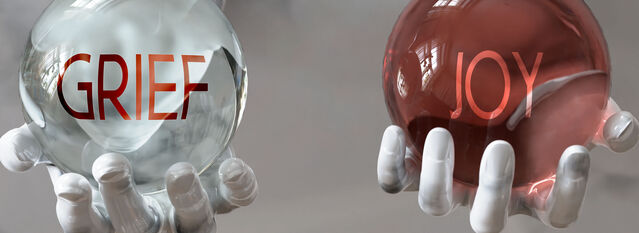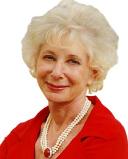Wisdom
Finding Joy Amid Uncertainty
How overcoming denial can help us live happy meaningful lives in perilous times
Posted January 29, 2021

Memorializing the 400,000 American lives lost to COVID-19 on the eve of her inauguration, Vice President Kamala Harris said, “my abiding hope, my abiding prayer is that we emerge from this ordeal with a new wisdom.” My Holocaust-survivor parents taught me that it is indeed possible to come away from even the most horrifying ordeals with new wisdom. The lessons for emotionally intelligent living that they gleaned from withstanding Nazi persecution could help us to emerge from what President Biden so aptly called “this winter of peril and possibility” better equipped to face future challenges.
Most of us today were unprepared—not just in practical terms, but emotionally and intellectually—for the pandemic, the recent assault on Congress, and our ongoing "homegrown insurgency" of violent extremists, despite many warnings. Life’s great trials often find us unready. Though the signs of fascism’s rise and Hitler’s aggression were clear, my parents, secure in their comfortable lives, were (like millions of others) unprepared when the Nazi invasion swept all that away. My father was incarcerated, beaten, and starved in hellish concentration camps, while my mother escaped with nothing after being detained and interrogated.
Human minds are deeply biased by prior experience, leaving us dangerously slow to understand and adapt when faced with drastically new situations, and susceptible to deadly denial. To succeed, we must escape this mental trap. Our present perils, like the Holocaust, can teach us to do better—but only if we are prepared to prioritize, act, and think differently. Here’s how:
Lessons for managing rapidly changing circumstances
1. Life is unpredictable and unfair. Don’t expect it to be otherwise, and don’t cry over split milk — even if someone else knocked your glass over. You can’t undo the past, but you can choose how to respond to it.
2. You can lose everything, including freedom, at a moment’s notice, due to individual actions, social forces, disease, death, or natural disaster. There is only one thing that no one can take away while you are alive: what’s in your brain. Develop it carefully and treasure it. Educate yourself as much as possible, both with knowledge and self-awareness.
3. The voice of reason is easily drowned out by clamoring emotions. Calm them, so reason may be heard and acted upon in time.
4. “It’s only money.” Material possessions offer comfort and pleasure, but life, health, meaningful work, hope, and love are all that truly matters. Don't allow attachment to money or things to interfere with these essentials for well-being, and be prepared to abandon everything to protect yourself or people you love if necessary.
Lessons for getting along with others (because no one makes it alone)
1. You are responsible for your attitudes, beliefs, and behavior—no matter the circumstances. Instead of repressing them, know them intimately so you can learn from their consequences, improving yourself and your outcomes. But all things done out of guilt come to a bad end, so acknowledge your mistakes, but forgive yourself by understanding the conflicts that caused them.
2. We are all capable of everything human, and everyone is doing the best they can. Given the right circumstances, anyone can become mentally ill, a villain, hero, or saint. Therefore Nazis, their victims, bystanders, and rescuers, are all equally human. Instead of judging others, imagine how you would feel if they treated you how you treat them, and how you would feel and act if you were in their situation. Alter your behavior, thinking, and emotional responses accordingly.
3. Insecure people denigrate and dominate others in fruitless attempts to boost their self-esteem. But blaming others makes us feel helpless, aggravating insecurity and preventing us from working to improve our situation.
4. Only loving deeply and knowing that someone truly cares and is committed to our well-being keeps us struggling to stay alive in dire circumstances. Make developing and fostering loving relationships your top priority.
Lessons for making the most of life no matter what happens
1. When your number is up, it’s up. Life is too short to do things you don’t believe in.
2. Suffering can be our greatest teacher, or destroy our better selves. We change only when fear or pain makes us (and if we can enjoy increasing self-awareness), because it takes sustained effort and hard work.
3. Compassion for oneself and others makes life more tolerable and enjoyable.
4. “You can’t dance at all weddings.” No one can do or have everything they desire. We must all weigh the options, make tough choices, and accept responsibility for and learn from the consequences.
5. Celebrate every meal, no matter how simple, with gratitude and joy. Every dessert is a cause for applause. If the sun is shining, you are alive, healthy, and have enough to eat, it’s a wonderful day!
Life (unfair as it may be) is a gift always worth celebrating. These lessons show how we can make things a bit better, no matter how harsh our circumstances. This provides us with life’s greatest treasure, besides love: hope.
According to my parents, coming to America and living by this hard-won wisdom allowed them to have better and more fulfilling lives than would have been possible in Austria (even without the Holocaust). They were able to pursue more deeply satisfying relationships, professions, and lifestyles, both because of America’s rule of law and openness to possibility, and because of their new perspectives.
We too now have an opportunity to emerge better prepared, intellectually and emotionally, to face the misfortunes still ahead without retreating into denial. As a nation, we can address circumstances that contributed to our twin disasters (an uncontrolled pandemic and overt threats to democracy) by prioritizing everyone’s health, security, and well-being. My parents’ wisdom can help us heed President Biden’s call to “fight the common foes we face: anger, resentment and hatred, extremism, lawlessness, violence, disease, joblessness, and hopelessness.”
Alternatively, we can continue on the same path of denial, and prioritizing profits and power over people, that led to our current failures.
By teaching us to focus and act on what truly matters, in good times and bad, my parents’ lessons can improve our quality of life, allowing us to imagine and pursue a different and brighter future. Despite the threats confronting us, we all—always—have the capacity to make things at least a bit better for ourselves and those around us.
References
Further reading
For an understanding of how the concentration camp experience can help us make better decisions for ourselves and our society, read Bruno Bettelheim's The Informed Heart: Autonomy in a Mass Age.
On what concentration camp survivors understood about the value of human kindness and compassion, see Bruno Bettelheim’s Surviving and Other Essays and Primo Levi’s The Drowned and The Saved.
For a brilliant study of how people have managed to gain intellectually, emotionally, and morally both despite and because of extreme situations, read Tzvetan Todorov, Facing the Extreme: Moral Life in The Concentration Camps
All of the above make clear that surviving horrifying ordeals can provide us with new wisdom, and that love and hope are essential to survive the worst.
The science behind these insights is explored by George Vaillant in Triumphs of Experience: The Men of the Harvard Grant Study, by John Cacioppo in Loneliness: Human Nature and the Need for Social Connection, and by Vivek Murthy in Together: The Healing Power of Human Connection in a Sometimes Lonely World.
Gyorgy Buzsaki explains how human minds work in The Brain from Inside Out.
Anne Case and Angus Deaton in Deaths of Despair and the Future of Capitalism, and Joseph E. Stiglitz in People, Power and Profits: Progressive Capitalism for an Age of Discontent, explore how economic inequality creates political, economic and personal crises, and how to address these problems.




